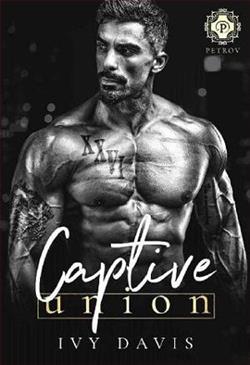Page 4 of Hammer
“He’ll meet us tomorrow at ten o’clock,” Levi read, his voice barely audible even though we were pressed shoulder to shoulder.“At the Coastal Coffee Shop on Palmetto Drive.Says to come alone but…” He paused, squinting at the message.“But he understands if that’s not possible and suggests bringing only immediate family.No friends, no one who might report back to Dad.”
Chase made a sound somewhere between a snort and a grunt.“At least he’s smart enough to know we wouldn’t let you go alone.”
The waves crashed against the shore in a deafening rush before receding with a hiss across the sand.The water had crept closer to our position as we sat talking, forcing us to shuffle back a few feet.The constant motion of the ocean mirrored the restless energy running through all three of us -- the perpetual vigilance that had become our normal.
“I should respond,” Levi said, his thumbs hovering over the phone.
“Tell him we’ll be there,” I confirmed after exchanging a glance with Chase.“All three of us.”
I watched as Levi typed the reply.For a moment, hope flickered in his expression -- a dangerous emotion in our situation, but one I couldn’t bring myself to temper.We needed something to hold onto, some belief that tomorrow might be better than today.
A particularly large wave crashed against the shore, sending spray high enough that we felt a fine mist against our faces.The salt water mingled with the tears I hadn’t realized were tracking down my cheeks.
“It’s really happening,” I whispered, more to myself than to my sons.“We’re really leaving.”
Chase’s arm came around my shoulders, a rare gesture of comfort from my eldest.“About damn time,” he said, no accusation in his voice, just grim satisfaction.
We sat in silence for several minutes, each lost in our own thoughts as the waves continued their relentless rhythm against the shore.Tomorrow would bring either the first step toward freedom or a devastating setback.There was no middle ground, no partial victory possible against a man like Piston.
“We should head to a motel,” Chase finally said, glancing at his watch.“Make sure everything is ready for tomorrow, get some sleep.”The way he said “sleep” made it clear he didn’t expect any of us to actually rest.
I nodded, brushing sand from my jeans as I prepared to stand.The night air had grown chilly, and I shivered, though not entirely from the cold.The magnitude of what we were planning pressed down on me -- seventeen years of being Piston’s old lady, of fear, of gradually shrinking myself to avoid his wrath, all coming to a head in a coffee shop meeting with a stranger.
“Mom?”Levi’s voice pulled me from my thoughts.“Are you okay?”
I tried to smile, to project a confidence I didn’t fully feel.“I’m fine, baby.Just thinking.”
He didn’t look convinced, his brow furrowing in that way that made him look so much older than fifteen.Without warning, his hand shot out to grip mine, his fingers interlacing with my own in a gesture that was both seeking and giving comfort.
The unexpected contact startled me.In our household, touch had become complicated -- sometimes a prelude to violence, sometimes a rare moment of affection, never predictable.We had all learned to minimize physical contact as a means of survival.But here, on this dark beach with the waves masking our presence, Levi held onto me as if I might disappear if he let go.
I looked down at our joined hands, noting how his fingers had grown longer over the past year, how the childish softness was giving way to adolescent angles.His grip was surprisingly strong, betraying the tension running through him despite the calm facade he tried to maintain.
Levi’s hand gripped mine tightly, his knuckles white with tension.Despite his slim build and gentle nature, there was surprising strength in his grasp -- a physical manifestation of the determination that had driven him to research our escape routes, to reach out to strangers who might help us, to believe in a future without fear.I studied his profile in the dim light, taking in details I sometimes missed in our day-to-day survival.
The moonlight caught the discoloration around his left eye, highlighting the sickly green-yellow that had once been an angry purple.Six days.It had been six days since Piston had caught Levi using his laptop without permission, six days since my youngest son’s head had been slammed against the kitchen counter when he’d tried to explain he was just working on a school project.The lie had been quick, intelligent -- Levi always thinking several steps ahead -- but not quick enough to avoid his father’s rage.
I gently traced the edge of the bruise with my free hand, feeling Levi tense before deliberately relaxing under my touch.He’d learned to control his flinching response, understanding that visible fear only provoked Piston further.It was a skill no child should have to master, yet my fifteen-year-old had perfected it with the same methodical attention he gave to his coding projects.
“Does it still hurt?”I asked softly, though we both knew the question went deeper than physical pain.
Levi shook his head, the movement slight.“Barely notice it anymore.”
The casual dismissal of his injuries -- that was new, a recent adaptation I’d observed with growing concern.Where once he would cry or seek comfort for his hurts, now he cataloged them with clinical detachment, assessing damage like a system diagnostic rather than a wounded child.
I remembered finding him in the bathroom that night, pressing a cold washcloth to his face, meticulously documenting the injury with his phone’s camera.“Evidence,” he’d explained when he saw me watching.“I’m creating a chronological record of escalation patterns.”His voice had been steady, his hands shaking only slightly as he angled his face to capture the swelling around his eye.
That moment had crystallized something for me -- the realization that my intelligent, sensitive son was being forced to mature in ways that would forever alter him.He was applying his analytical mind to our survival, transforming trauma into data points, fear into action items.
“You’ve been so brave,” I told him now, squeezing his hand.“Braver than anyone should have to be at your age.”
He looked at me then, his eyes -- so much like mine -- serious behind his glasses.“Bravery is just fear that’s been properly analyzed and mitigated,” he said, with the earnest wisdom that occasionally emerged from him like these startling gems.“I identified the threat, researched solutions, and formulated an exit strategy.It’s just problem-solving, Mom.”
But I knew better.I’d heard him at night, the muffled sounds of crying he tried to hide, the nightmares that left him gasping for air.Unlike Chase, who channeled his fear into hyper vigilance and physical protection, Levi processed his terror internally, transforming it through the alchemy of his brilliant mind into spreadsheets and contingency plans.
“It’s more than that,” I insisted.“You found a way out when I couldn’t see one.You reached out when I was too scared to try.”
He glanced away, uncomfortable with praise as always.The bruise on his cheekbone seemed to darken as he turned, a shadow within a shadow.“I just didn’t want him to hurt us anymore.”A simple statement that carried the weight of years of abuse, of watching his mother bleed, of feeling his own bones crack under his father’s grip.















